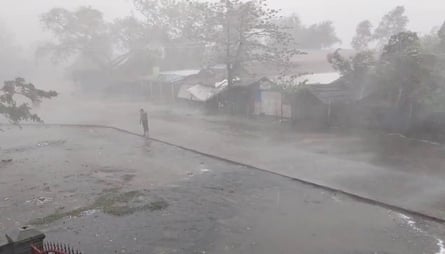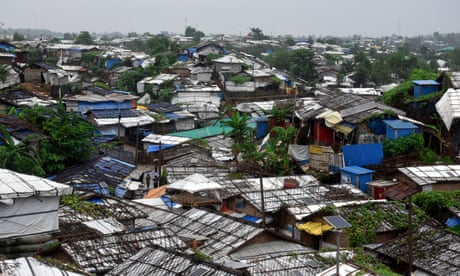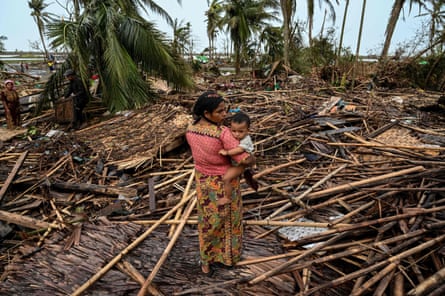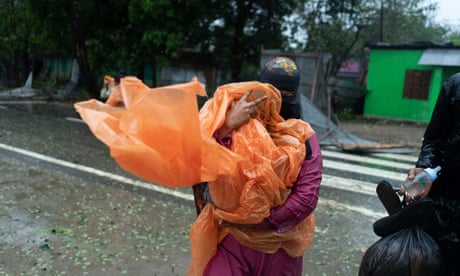The attack on Buthidaung – where thousands of Rohingya Muslims had sought refuge – has been called a "turning point" in what has been dubbed a "slow-burning genocide"
It was late evening when the first bursts of gunfire echoed through the town of Buthidaung in western Myanmar. Soon after, dark plumes of smoke rose as home after home was set ablaze.
Thousands of Rohingya Muslims had sought refuge in Buthidaung after their villages had been caught in the crossfire between Myanmar's military – which seized control of the country in a 2021 coup – and armed resistance fighters from the Arakan Army.
Witnesses reported that on 17 May, gunmen ordered everyone in the Rohingya-majority town to leave before 10am the following day. Despite the deadline, the men returned that evening, surrounded the town and began a campaign of looting and arson.
 Rohingya Muslim refugees shout slogans during a protest against the persecution of Rohingya Muslims in Myanmar, near the Myanmar Embassy in Kuala Lumpur in November 2016. Photo: Chris JUNG / Alamy
Rohingya Muslim refugees shout slogans during a protest against the persecution of Rohingya Muslims in Myanmar, near the Myanmar Embassy in Kuala Lumpur in November 2016. Photo: Chris JUNG / AlamyThe destruction was so extensive that the United Nations High Commissioner for Human Rights (UNHCR) stated, "testimonies, satellite images, and online videos and pictures indicate that Buthidaung town has been largely burned". One witness claimed to have seen "dozens of dead bodies" as they fled.
As many as 200,000 Rohingya have been newly displaced, according to estimates, but the true extent of casualties remains unclear due to a military-imposed communications blackout across Rakhine State.
The majority of eyewitnesses placed the blame on the Arakan Army – which claims to fight for "self-determination, national equality, justice, and freedom" – yet the resistance group has denied involvement. In a statement, it accused the military of "spreading false narratives and accusations relentlessly" and blamed the burning of Buthidaung to military airstrikes.
Nay San Lwin, co-founder of the Free Rohingya Coalition, expressed dismay at what he believes are the Arakan Army's actions. "The primary aggressor is the Myanmar military, but we didn't expect that the Arakan Army would act exactly like the Myanmar military," he told Byline Times. "Although we have documented many abuses by the Arakan Army since 2019, we thought they would change their strategy toward the Rohingya."
Approximately 600,000 Rohingya remain in Rakhine State, most of them survivors of a 2017 genocide that claimed over 20,000 lives and forced nearly a million to flee the country – the largest exodus in Asia since the Vietnam War. At the time, a UN fact-finding body called it a "textbook example of ethnic cleansing and slow-burning genocide".
Violence has returned to Rakhine State in recent months as the Arakan Army has begun making significant gains in its bid to control the region. The UNHCR says it has documented attacks on civilians by both the military and the Arakan Army, including airstrikes, executions, beheadings, disappearances, and the burning of homes.
The Free Rohingya Coalition claims there has been "significant massacres" but called the attack on Buthidaung a turning point. "The Arakan Army didn't even wait until the Myanmar military fell from all townships in Rakhine State," Nay San Lwin said. "They have shown their true colours once the town with the largest Rohingya population came under their control.
"The current situation and oppression against the Rohingya by the Arakan Army suggest that violence, human rights abuses, and other forms of persecution will continue," he added. "As of now, the Arakan Army has already committed crimes against humanity and war crimes. We are worried that there will be another round of genocide in the near future. The Rohingya could face an even worse situation than in 2017."
The military junta's communication blackouts have plunged much of Rakhine State into isolation, allowing atrocities to occur away from the world's gaze. Only weeks after the arson attack on Buthidaung, reports surfaced of a significant assault on the Rohingya, this time allegedly by the Myanmar military. Eyewitnesses recounted to the BBC "two-and-a-half days of terror," describing how soldiers blindfolded and beat them, poured burning petrol on their skin, and forced some to drink urine. Over 50 people were killed.
Furthermore, the military regime has deliberately deprived the Rohingya of basic necessities, including adequate food, water, shelter, sanitation and medical care. Earlier this year, it also began conscripting Rohingya civilians into mandatory service. With minimal training and being thrust into front-line combat, it is feared that these conscripts are being used as human shields.
Once again, the world seems to be failing a desperate people in their hour of peril while a hate-driven unnatural disaster unfolds in real time in Myanmar's Rakhine State
Tom Andrews, the UN Special Rapporteur on the human rights situation in Myanmar
The population is facing an "existential threat," according to a joint statement from 28 human rights organisations, which have urged the international community to "immediately put pressure on the Arakan Army to end mass forced displacement and human rights violations against Rohingya communities."
Particular pressure is on the British government, the UN Security Council's penholder for Myanmar, which would typically lead on council statements or resolutions. Many rights organisations have called on the UK to convene a UN Security Council session in light of actions by the Arakan Army as well as the military's blatant violation of the International Court of Justice's 2020 ruling that it should take all measures to protect the Rohingya.
The world's slow reaction to the brutal violence risks a repeat of the lead-up to the 2017 genocide where the UK and US were providing Myanmar's military with military aid and support despite ongoing reports of massacres, arson and sexual violence. The two countries only halted the aid when it became undeniable that ethnic cleansing was taking place.
With the UK now deep in preparations for a general election and its foreign policy being focussed on conflicts in Ukraine and Gaza, it remains uncertain whether the government will take the lead before there is a more settled political climate.
ENJOYING THIS ARTICLE? HELP US TO PRODUCE MORE
Receive the monthly Byline Times newspaper and help to support fearless, independent journalism that breaks stories, shapes the agenda and holds power to account.
We're not funded by a billionaire oligarch or an offshore hedge-fund. We rely on our readers to fund our journalism. If you like what we do, please subscribe.
Tom Andrews, the UN Special Rapporteur on the human rights situation in Myanmar, warned there would be a "bloodbath" that could claim "thousands of innocent lives" if the international community does not act. "Once again, the world seems to be failing a desperate people in their hour of peril while a hate-driven unnatural disaster unfolds in real time in Myanmar's Rakhine State," he said.
"The choice of these states to either step up or step away from this horror could literally be a matter of life and death for countless Rohingya."





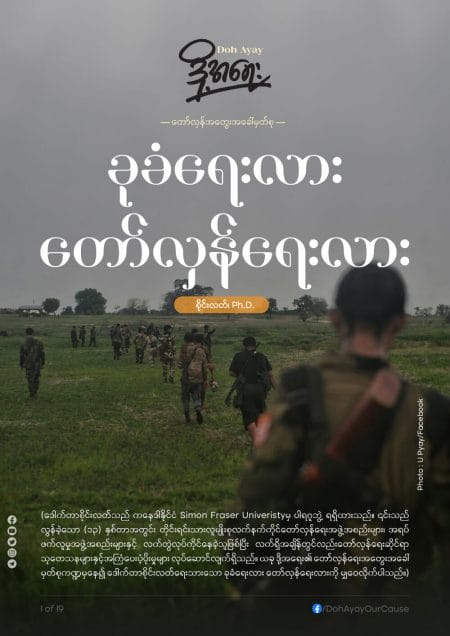
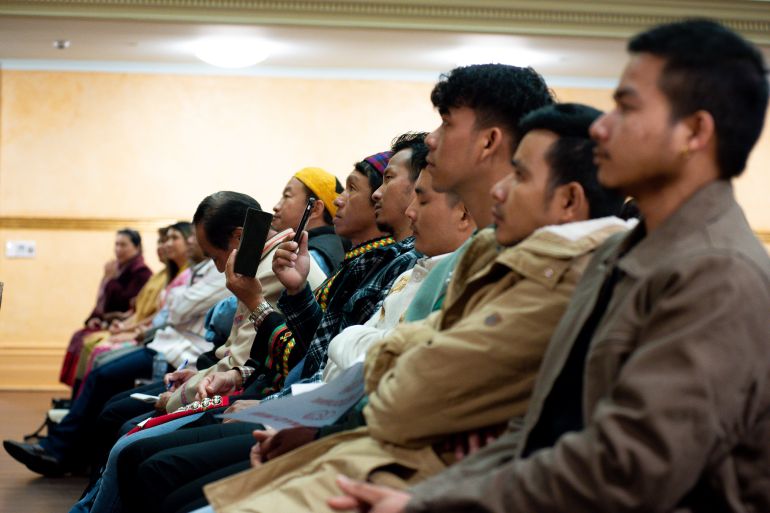
 The Australia trip of NUG Minister for Human Rights Aung Myo Min was planned to shore up support among the Myanmar community there and build momentum for recognition [Ali MC/Al Jazeera]
The Australia trip of NUG Minister for Human Rights Aung Myo Min was planned to shore up support among the Myanmar community there and build momentum for recognition [Ali MC/Al Jazeera]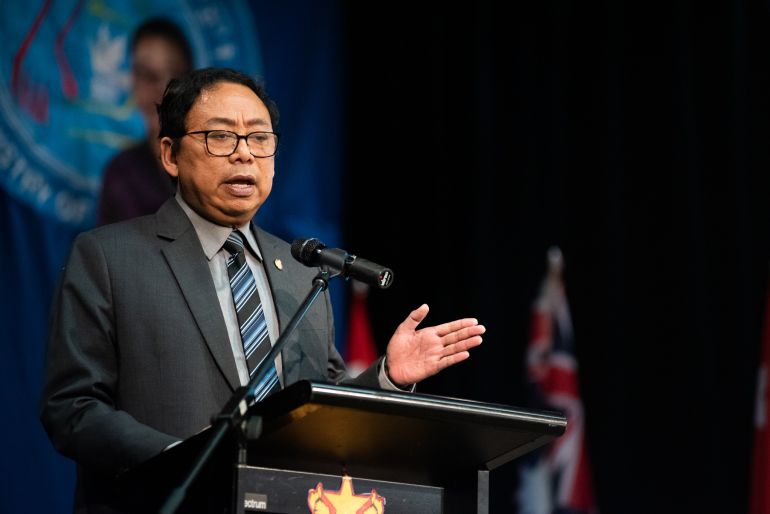 NUG Minister for Human Rights Aung Myo Min speaks to the Myanmar diaspora in Melbourne amid concerns about its engagement with ethnic minorities [Ali MC/Al Jazeera]
NUG Minister for Human Rights Aung Myo Min speaks to the Myanmar diaspora in Melbourne amid concerns about its engagement with ethnic minorities [Ali MC/Al Jazeera]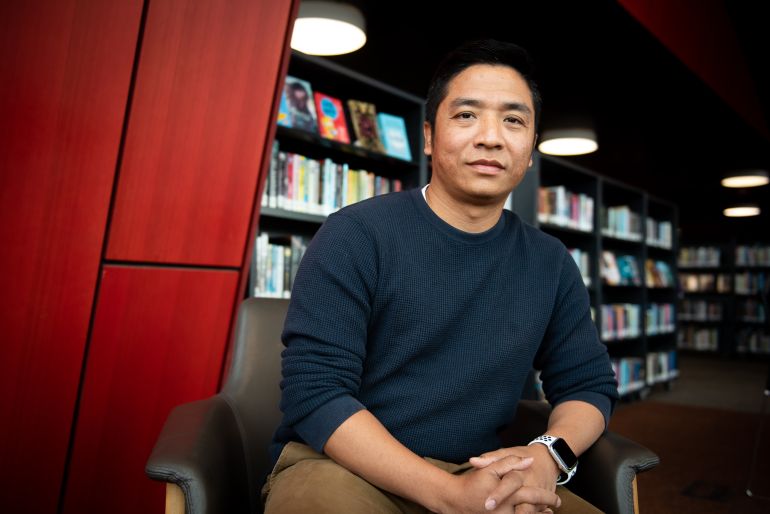 Rual Thang, who is originally from Chin state, says the NUG and ethnic groups need to improve coordination to overthrow the military regime [Ali MC/Al Jazeera]
Rual Thang, who is originally from Chin state, says the NUG and ethnic groups need to improve coordination to overthrow the military regime [Ali MC/Al Jazeera] Habiburahman, a Rohingya in exile, says he wonders whether the NUG is sincere in its intentions [Ali MC/Al Jazeera]
Habiburahman, a Rohingya in exile, says he wonders whether the NUG is sincere in its intentions [Ali MC/Al Jazeera]
